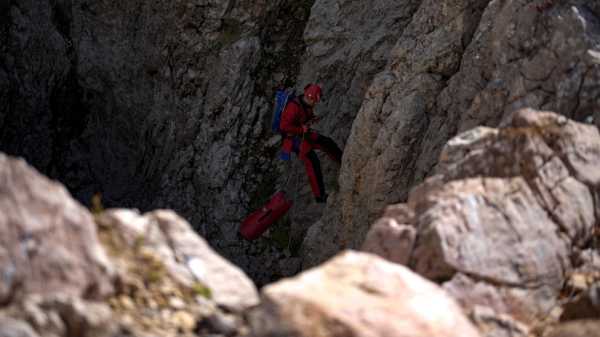 about the successful rescue of a US researcher who was trapped in a deep Turkish cave />
about the successful rescue of a US researcher who was trapped in a deep Turkish cave />
ANKARA, Turkey — A major rescue operation in Turkey’s Taurus Mountains succeeded in bringing out an American researcher who fell seriously ill nine days ago at a depth of some 1,000 meters (3,000 feet) from the entrance of one of the world’s deepest caves. An experienced cave rescuer himself, Mark Dickey was assisted by teams of international rescuers who by Monday had gotten him to 100 meters (some 330 feet) from the surface. They brought him out early Tuesday.
Here’s what to know about the caver and the rescue operation:
Dickey, a 40-year-old accomplished cave explorer from Croton-on-Hudson, New York, was 1,040 meters (3,412 feet) from the entrance of the Morca Cave on an expedition, when he became stricken with severe stomach bleeding Sept. 2. There were several people with him, including three other Americans, on the mission to map the 1,276-meter (4,186-foot) deep cave system for the Anatolian Speleology Group Association.
With his condition perilous, doctors, paramedics and experienced cavers from Turkey and across Europe rushed to his rescue. One Hungarian doctor went down to treat Dickey at his location as early as Sept. 3. Doctors administered IV fluids and 4 liters (1 gallon) of blood while he was still inside the cave to stabilize his condition and pave the way for his rescue. Teams comprised of a doctor and three to four other rescuers took turns staying by his side at all times.
The European Association of Cave Rescuers described Dickey as “a highly trained caver and a cave rescuer himself” and well-known cave researcher, or speleologist. He is the secretary of the association’s medical committee.
“Mark is the guy that should be on that rescue mission that’s leading and consulting, and for him to be the one that needs to be rescued is kind of a tragedy in and of itself,” said Justin Hanley, a 28-year-old firefighter from near Dallas, Texas, who had met Dickey during a cave rescue course the researcher taught in Hungary and Croatia.
The Morca Cave in southern Turkey’s Taurus Mountains is the country’s third deepest, a very complex system with many vertical shafts and a few horizontal sections.
The biggest challenges the rescuers faced were the steep vertical sections and navigating through mud and water at low temperatures in the horizontal sections. There was also the psychological strain of being inside a dark, damp cave for extended periods, experts said.
Temporary medical camps were set up along the tunnel to provide assistance and resting spots as Dickey was gradually extracted. The tunnel also needed to be re-equipped with new ropes and a communication line had to be drawn. Some narrow cave passages had to be widened as Dickey was being moved up on a stretcher.
Gretchen Baker, the national coordinator for the U.S.-based National Cave Rescue Commission, who has known Dickey for more than 10 years, said before the mission was completed that his experience as a rescuer was a benefit.
“Because of his experience teaching and doing these rescues, he understands exactly what is ahead of him,” Baker said, adding that while it isn’t easy to be tied to the stretcher, Dickey personally knew some of the rescuers from Europe.
After the initial treatment deep underground, doctors gave the go-ahead for the operation to begin to bring Dickey to surface Saturday, after they assessed he was well enough to be moved. The American was first lifted from his location to a camp 700 meters from the surface and then to the 500 meters level.
The operation involved stops so that Dickey could recuperate at several medical camps that had been set up along the way.
The Italian National Alpine and Speleological Rescue said Monday that Dickey recognized some sections of the cave and reacted positively, understanding that he was getting closer to the exit.
The Speleological Federation of Turkey said Dickey reached the 100-meter mark Monday evening after taking a rest at a temporary camp at 180 meters.
Then it announced that Dickey had been removed from the last exit of the cave at 12:37 a.m. Tuesday
Some 190 personnel from Turkey and eight other countries — Italy, Hungary, Bulgaria, Romania, Croatia, Poland, Albania and the United States — assisted in the rescue. More than 150 of them are experts in the field of search and rescue.
Last week, Dickey thanked the caving community and the Turkish government for their efforts in a video message from inside the cave.
“The caving world is a really tight-knit group and it’s amazing to see how many people have responded on the surface,” Dickey said. “I do know that the quick response of the Turkish government to get the medical supplies that I need, in my opinion, saved my life. I was very close to the edge.”
___
Associated Press journalists Robert Badendieck and Ayse Wieting in Istanbul, Cinar Kiper in Bodrum, Turkey, Mike Catalini in Trenton, New Jersey, and Patricia Thomas in Rome contributed to this report.
Sourse: abcnews.go.com






